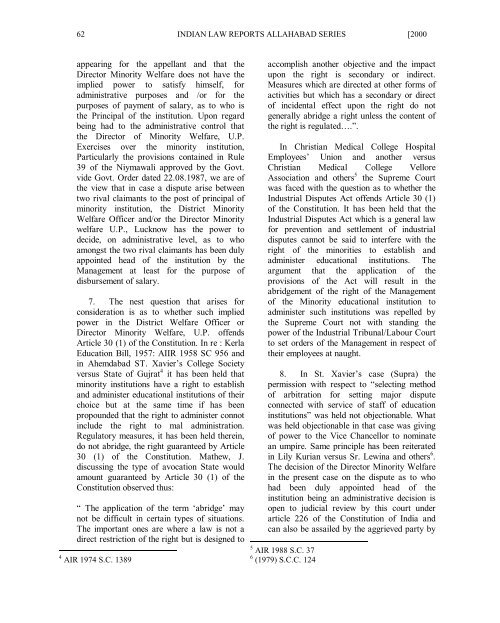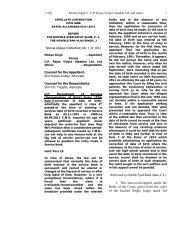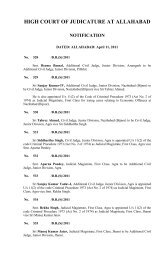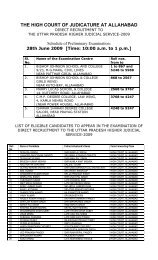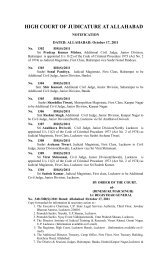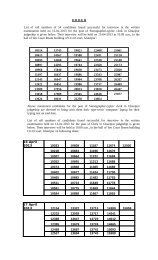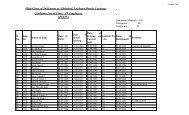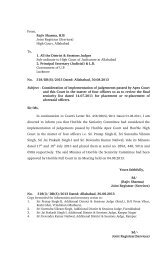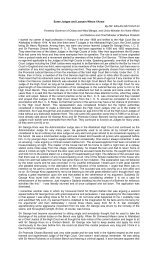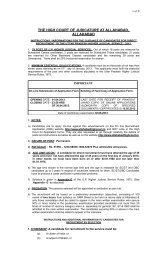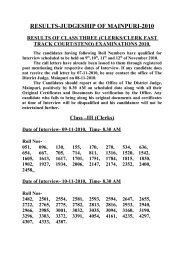May - High Court of Judicature at Allahabad
May - High Court of Judicature at Allahabad
May - High Court of Judicature at Allahabad
Create successful ePaper yourself
Turn your PDF publications into a flip-book with our unique Google optimized e-Paper software.
62<br />
INDIAN LAW REPORTS ALLAHABAD SERIES [2000<br />
appearing for the appellant and th<strong>at</strong> the<br />
Director Minority Welfare does not have the<br />
implied power to s<strong>at</strong>isfy himself, for<br />
administr<strong>at</strong>ive purposes and /or for the<br />
purposes <strong>of</strong> payment <strong>of</strong> salary, as to who is<br />
the Principal <strong>of</strong> the institution. Upon regard<br />
being had to the administr<strong>at</strong>ive control th<strong>at</strong><br />
the Director <strong>of</strong> Minority Welfare, U.P.<br />
Exercises over the minority institution,<br />
Particularly the provisions contained in Rule<br />
39 <strong>of</strong> the Niymawali approved by the Govt.<br />
vide Govt. Order d<strong>at</strong>ed 22.08.1987, we are <strong>of</strong><br />
the view th<strong>at</strong> in case a dispute arise between<br />
two rival claimants to the post <strong>of</strong> principal <strong>of</strong><br />
minority institution, the District Minority<br />
Welfare Officer and/or the Director Minority<br />
welfare U.P., Lucknow has the power to<br />
decide, on administr<strong>at</strong>ive level, as to who<br />
amongst the two rival claimants has been duly<br />
appointed head <strong>of</strong> the institution by the<br />
Management <strong>at</strong> least for the purpose <strong>of</strong><br />
disbursement <strong>of</strong> salary.<br />
7. The nest question th<strong>at</strong> arises for<br />
consider<strong>at</strong>ion is as to whether such implied<br />
power in the District Welfare Officer or<br />
Director Minority Welfare, U.P. <strong>of</strong>fends<br />
Article 30 (1) <strong>of</strong> the Constitution. In re : Kerla<br />
Educ<strong>at</strong>ion Bill, 1957: AIIR 1958 SC 956 and<br />
in Ahemdabad ST. Xavier’s College Society<br />
versus St<strong>at</strong>e <strong>of</strong> Gujr<strong>at</strong> 4 it has been held th<strong>at</strong><br />
minority institutions have a right to establish<br />
and administer educ<strong>at</strong>ional institutions <strong>of</strong> their<br />
choice but <strong>at</strong> the same time if has been<br />
propounded th<strong>at</strong> the right to administer connot<br />
include the right to mal administr<strong>at</strong>ion.<br />
Regul<strong>at</strong>ory measures, it has been held therein,<br />
do not abridge, the right guaranteed by Article<br />
30 (1) <strong>of</strong> the Constitution. M<strong>at</strong>hew, J.<br />
discussing the type <strong>of</strong> avoc<strong>at</strong>ion St<strong>at</strong>e would<br />
amount guaranteed by Article 30 (1) <strong>of</strong> the<br />
Constitution observed thus:<br />
“ The applic<strong>at</strong>ion <strong>of</strong> the term ‘abridge’ may<br />
not be difficult in certain types <strong>of</strong> situ<strong>at</strong>ions.<br />
The important ones are where a law is not a<br />
direct restriction <strong>of</strong> the right but is designed to<br />
4 AIR 1974 S.C. 1389<br />
accomplish another objective and the impact<br />
upon the right is secondary or indirect.<br />
Measures which are directed <strong>at</strong> other forms <strong>of</strong><br />
activities but which has a secondary or direct<br />
<strong>of</strong> incidental effect upon the right do not<br />
generally abridge a right unless the content <strong>of</strong><br />
the right is regul<strong>at</strong>ed….”.<br />
In Christian Medical College Hospital<br />
Employees’ Union and another versus<br />
Christian Medical College Vellore<br />
Associ<strong>at</strong>ion and others 5 the Supreme <strong>Court</strong><br />
was faced with the question as to whether the<br />
Industrial Disputes Act <strong>of</strong>fends Article 30 (1)<br />
<strong>of</strong> the Constitution. It has been held th<strong>at</strong> the<br />
Industrial Disputes Act which is a general law<br />
for prevention and settlement <strong>of</strong> industrial<br />
disputes cannot be said to interfere with the<br />
right <strong>of</strong> the minorities to establish and<br />
administer educ<strong>at</strong>ional institutions. The<br />
argument th<strong>at</strong> the applic<strong>at</strong>ion <strong>of</strong> the<br />
provisions <strong>of</strong> the Act will result in the<br />
abridgement <strong>of</strong> the right <strong>of</strong> the Management<br />
<strong>of</strong> the Minority educ<strong>at</strong>ional institution to<br />
administer such institutions was repelled by<br />
the Supreme <strong>Court</strong> not with standing the<br />
power <strong>of</strong> the Industrial Tribunal/Labour <strong>Court</strong><br />
to set orders <strong>of</strong> the Management in respect <strong>of</strong><br />
their employees <strong>at</strong> naught.<br />
8. In St. Xavier’s case (Supra) the<br />
permission with respect to “selecting method<br />
<strong>of</strong> arbitr<strong>at</strong>ion for setting major dispute<br />
connected with service <strong>of</strong> staff <strong>of</strong> educ<strong>at</strong>ion<br />
institutions” was held not objectionable. Wh<strong>at</strong><br />
was held objectionable in th<strong>at</strong> case was giving<br />
<strong>of</strong> power to the Vice Chancellor to nomin<strong>at</strong>e<br />
an umpire. Same principle has been reiter<strong>at</strong>ed<br />
in Lily Kurian versus Sr. Lewina and others 6 .<br />
The decision <strong>of</strong> the Director Minority Welfare<br />
in the present case on the dispute as to who<br />
had been duly appointed head <strong>of</strong> the<br />
institution being an administr<strong>at</strong>ive decision is<br />
open to judicial review by this court under<br />
article 226 <strong>of</strong> the Constitution <strong>of</strong> India and<br />
can also be assailed by the aggrieved party by<br />
5 AIR 1988 S.C. 37<br />
6 (1979) S.C.C. 124


